 Opportunities to learn from Europe will no longer be available after Brexit. This is because the UK will be absent from EU policy coordination processes specifically designed to promote learning. In this blog, Kate Mattocks (University of East Anglia) writes about what exactly will no longer be available to the UK, after Brexit.
Opportunities to learn from Europe will no longer be available after Brexit. This is because the UK will be absent from EU policy coordination processes specifically designed to promote learning. In this blog, Kate Mattocks (University of East Anglia) writes about what exactly will no longer be available to the UK, after Brexit.
While Brexit’s putative material impacts have received a great deal of attention, the same cannot be said for its effects on governance and policy-making, particularly policy coordination and policy learning. One of the effects of the United Kingdom leaving the European Union will be the loss of opportunity to participate in EU policy coordination – formalised collaborating, sharing, and learning from other EU member states. While policy coordination has its design challenges, the EU is one of the most significant venues for learning across governments in the world.
The EU has been described as “a platform for learning and policy transfer.” Learning is embedded in the way the EU operates. It is implicit in legislative processes and workings of institutions, but it is a core part of ‘softer’ policy coordination processes such as the Open Method of Coordination (OMC). The topics tackled in policy coordination are some of the most difficult issues we face in society: homelessness, child poverty, access to health care and long-term care, how to foster intercultural dialogue with marginalised groups in society, social exclusion and young people, and more.
Coordination takes place in policy fields that the EU doesn’t have full competence in, such as health, education, culture, research, and some aspects of economic and social policy. The principle of subsidiarity is strongly adhered to, meaning that whatever is done at the EU level supplements but does not override the member states’ laws and policies on these issues. EU member states coordinate policy for a variety of reasons; the goal may be convergence or the exchange of best practice. Ultimately, coordination promotes policy learning and change without legislative or hard law procedure – putting member states “on a path towards achieving common objectives, while respecting different underlying values and arrangements”.
Although the OMC works in different ways in different policy fields, typically, targets or goals are first agreed in the Council of Ministers. Each member state then considers ways to reach them, which may involve domestic reforms. Member states then report back on progress; these discussions take place in working groups composed of experts representing member states, who are usually affiliated with national public administrations in some way. Review and recommendations, in the form of benchmarking, best practice guidelines, and indicators, are built into the process as well (see work by Charles Sabel and Jonathan Zeitlin for more detailed analysis of the features of experimentalist governance).

One of the key features of EU policy coordination is that it involves some degree of reflection. In typical day-to-day policy-making, there is rarely much time or space for reflexivity on what has worked and what hasn’t. Importantly, there are even fewer opportunities to share this with other public administrations. Policy coordination thus represents a unique opportunity to discuss problems collaboratively. This is especially important given the multifaceted nature of the topics at hand. Issues such as poverty, migrant integration, and social care, for example, are extremely complex, affecting many different government departments and levels.
Of course, policy coordination isn’t without its problems. The precise outcomes of coordination are difficult to identify and measure, and there have been a range of issues identified with the design of the EU’s coordination efforts. My own research, on policy coordination in the arts and cultural sector, identified issues such as vague discussion topics, a short timeframe, a reactive approach, and difficulties with language and terminology.
Despite these challenges, there is evidence to suggest that coordination has a range of positive outcomes, even if it does not always automatically lead to concrete policy change or transfer. It is these types of opportunities that will be lost when the UK leaves the EU. One of the obvious advantages is an increased awareness of policies and programmes in other member states. This then may lead to the leverage effect, whereby recommendations from the EU level can lend credibility to ideas that may not be well-established in a domestic context, and be used to promote domestic reform. This may be information on how policies or programmes are formulated, implemented, or evaluated, or on institutional arrangements, which may then lead to increased capacity-building within member states. Coordination has also been shown to result in new horizontal and vertical cooperation, and the opening up of dialogue, domestically.
After Brexit, with the UK absent from these processes specifically designed to promote learning, it will become more difficult to access information on how other member states are tackling policy problems. The UK will also lose the opportunity to share its own expertise and be involved in setting standards, helping to create a common language and framework for discussion. Learning involves the acquisition of knowledge, the translation of that knowledge, and then dissemination. In EU policy coordination, learning can take place on both the individual and collective level. The composition of the working groups, involving experts from 28 member states, is a sui generis aspect of problem-solving, as “… groups made up of people with diverse identities produce different and deeper explanations.” The transnational, intercultural nature of these discussions, therefore, has benefits in terms of learning from other contexts. Coordination also involves deliberation, a process that, by its very nature, involves a “conscious confrontation of one’s own point of view.”
The loss of opportunities to socialise and network is also unfortunate. Communities of practice and knowledge networks are created as a result of policy coordination, in cross-national and national contexts and in both formal and informal ways. Importantly, the experts I interviewed for my research felt that there were no other similar professional opportunities to do so. These networks and connections continue long after the end of the formal coordination process.
Ultimately, the strength of EU policy coordination lies in the opportunities to reflect upon what works and what doesn’t, to discuss and debate policy solutions with other member states, and to learn from others. There is a chance that at some point in the post-Brexit future, the UK may be able to participate in some EU-based networks, but that remains unknown at this point, and very much subject to the political will of both the UK and EU. While many of the participating experts in my study were critical of some aspects of coordination, they were all overwhelmingly in favour of it. They believed that learning from other member states was a good ‘add-on’ to what they were already doing in their own country, and that coordination added value to domestic policies and programmes. Many participants also explicitly mentioned that they felt these were issues that should be discussed at the supranational level, even if legally they remain in the domain of the member states. To the detriment of the UK and its policy-making – and its problem-solving – these opportunities will no longer be available after Brexit.
This post represents the views of the author and not those of the Brexit blog, nor the LSE.
Kate Mattocks is a Lecturer in Politics at the University of East Anglia.







Setting aside the fact that this is another pro EU article
Clearly it spells out that even if Europe make progress in fields such as medicine and research then they won’t share that good with us!
It therefore underlines the fact that Europe is a protectionist society that says if you not a participant in our club then go away.
But wait!!
Can we have your money first?
Ohh and wait!!!
If you want to sell us something we will want our tarrif, to pay for our gravy boat.
But if we want to sell you something you can’t or shouldn’t tax us, that’s not fair, after all we are the leaders of Europe!
As for Trump, the audacity of taxing German cars just because Europe tax American cars is really not on!!!
I would suggest to the writer of this article that leaning and knowledge is world wide.
If Europe don’t want us to be their friends then don’t use our universities.
On the other hand it’s a big world out there and knowledge is not restricted to Europe!